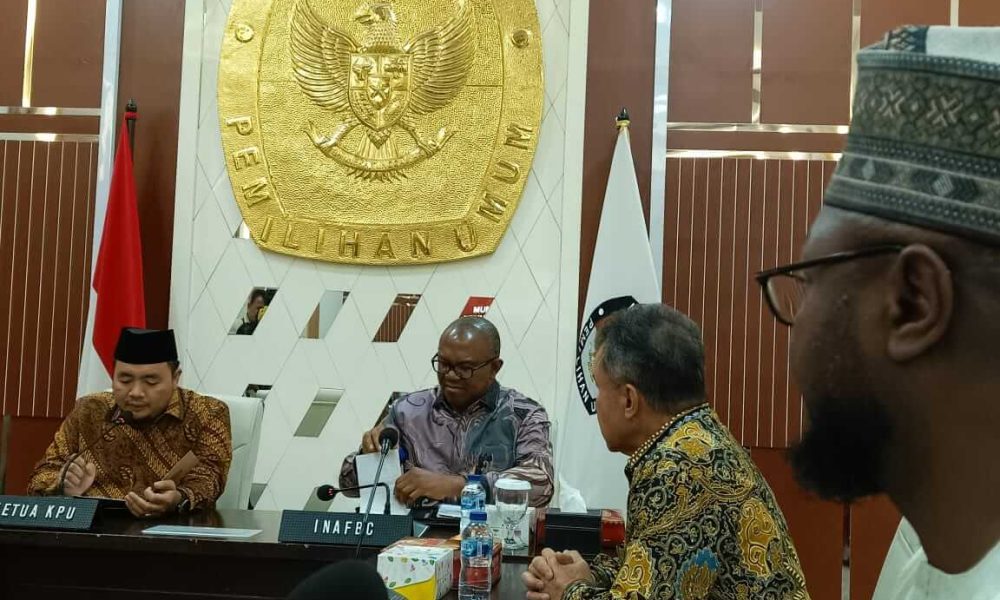The former presidential candidate of the Labour Party, Peter Obi, has called for a reform of Nigeria’s electoral system.
Henzodaily reports that Obi said only a reformed electoral system would renew citizens’ trust in democracy and strengthen electoral institutions.
He stated this on Wednesday while speaking on his engagement with the Indonesia electoral commission.
The former governor of Anambra State stressed that good governance would thrive where the electoral process was compromised. He noted that Nigeria lacked good governance because it lacked credible elections.
His words: “Still, in my Indonesia experience, one of the greatest obstacles to credible democracy and, consequently, good governance in Nigeria is the lack of credible elections, brought about by the glaring weakness of our electoral institutions and the persistent disregard for the rule of law.
“Democracy and good governance cannot thrive where the electoral process is compromised, and public confidence in its outcomes is eroded.
“During my learning visit to Indonesia, I had a useful discussion with the Chairman and Secretary-General of Indonesia’s General Elections Commission (KPU), Mr. Bernard Dermawan Sutrisno, about the nation’s electoral process—a system that stands in stark contrast to ours.
“With increased confidence in the electoral process, Indonesia’s national elections have consistently recorded over 70% voter participation, with the most recent election in 2024 reaching 81%. In contrast, Nigeria, despite having 94 million registered voters, recorded an abysmal turnout of less than 25%—a direct consequence of growing distrust in the electoral process.
“A key highlight of our discussion on electoral transparency centred on candidate qualification. To contest in Indonesia’s presidential elections, a candidate must provide verifiable records of primary, secondary, and at least a university degree.
“Non-compliance leads to immediate disqualification. Beyond educational qualifications, candidates must also meet strict eligibility criteria. They must secure the endorsement of at least 25% of National Assembly members or have obtained at least 20% of the votes in the previous presidential election.
“For vote counting, all ballots must be counted at the polling booth and recorded in the presence of the public, particularly representatives of various political parties.
“Any disputes that arise are resolved immediately at the booth level to ensure transparency and accountability.
“A candidate is only declared the winner if they secure at least 50%+1 of the total votes. If no candidate meets this threshold, a runoff election is conducted between the two candidates with the highest number of votes. Vote buying and electoral offences are minimal due to the strong role of security agencies and the swift prosecution of disputes through the constitutional courts.
“Indonesia’s National Assembly follows a proportional representation system, ensuring a more equitable distribution of political power.
“In the event of an elected legislator resigning or defecting to another party or dying, the party automatically replaces such a person because the votes he got were for the party, not in his personal capacity. Because of that, defection is not an option and helps stability of parties and the government to build alliances.
“While conducting an independent survey by engaging with people in public spaces at the airport to gauge their views on leadership, the economy, and the electoral process, it became evident that their confidence in the electoral body remains strong. For most of them, if there is no trust, why hold elections?
“Our conversation underscored a crucial reality: democracy is only as strong as the institutions that uphold it. Without an independent and credible electoral body, a judiciary that enforces electoral laws without bias, and a political culture that respects democratic principles, elections become nothing more than a ritualistic exercise devoid of legitimacy, and continued bad governance.
“If Nigeria is to truly embrace democracy, we must urgently reform our electoral system, strengthen our institutions, and restore public trust in the process. “
